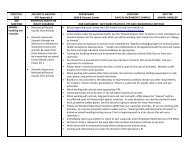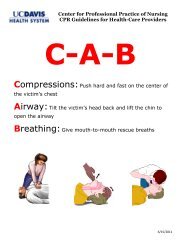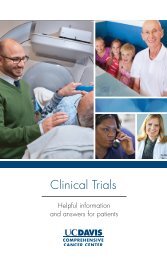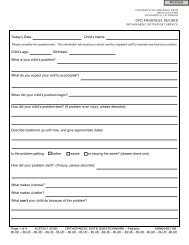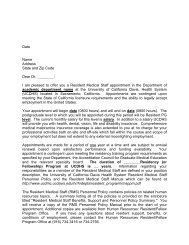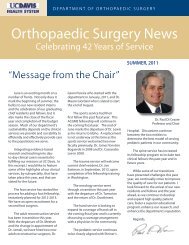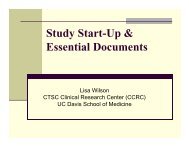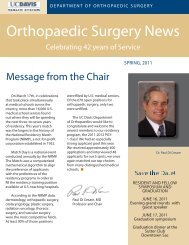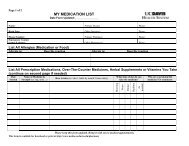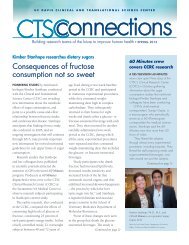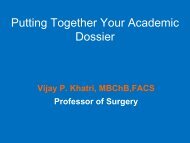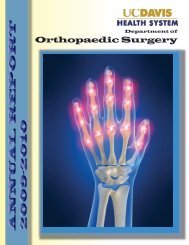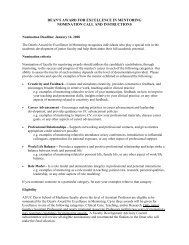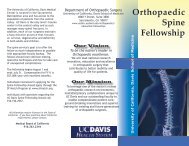3. Interpretation of urine microscopic4. Chronic catheter management5. Prostate screening protocols6. VasectomyOUR PARTNERSHIP IN LEARNINGLearning and teaching represents a partnership that is dynamic and challenging. Every personhas their own background experiences, their “best” way to learn, and their “style” of teaching.At one moment the resident may be the learner, and at the next the teacher. Different teachersmay have very different (and equally successful) methods for managing a particular clinicalproblem. As a result, clear communication on needs and expectations will help the process alongsubstantially. The full time and volunteer faculty teach because they want to, and the residentsare here to develop in three short years the skills necessary to launch a successful career.II. Clinical Rotations and ExperiencesADVANCED LIFE SUPPORT TRAINING<strong>Resident</strong>s are required to maintain certification in NRP and PALS, CardiopulmonaryResuscitation (Basic Life Support) and Advanced Cardiac Life Support (ACLS) all of which arecompleted during orientation. Re-certifications are required at the end of the R-2 year and canbe taken at Mercy (Plan ahead for this). Advanced Trauma Life Support (ATLS) is an excellentintensive course, which is required for any resident who is licensed and who wishes to moonlightat a rural/remote ED in California. ATLS courses are available but often hard to schedule, soplanning ahead is very important. The residency program will pay for the course registration,but all other costs are the resident’s. Finally, ALSO courses are provided through the <strong>UC</strong> <strong>Davis</strong>Network, and all residents are encouraged to attend. Beginning in 2011, all PGY1 residents willbe required to attend.A. Service GoalsBEHAVIORAL SCIENCE CURRICULUMThe primary objective of the Behavioral Science Curriculum is to help Family Practice<strong>Resident</strong>s more fully develop the skills and the knowledge base needed to intervenemeaningfully and efficiently in the mental health issues of patients. A large percentageof patients seeking ambulatory care have a psychosocial or cultural issue of significancethat if unrecognized or mismanaged seriously impairs the effectiveness of the physician’scare. <strong>Resident</strong>s are expected to achieve the full set of Behavioral Science and PsychiatryCompetencies through this curriculum (See also Residency Goals and Competencies).Page 26 of 153C:\Documents and Settings\dhutak\Desktop\rshb13.doc
B. Service DescriptionC. DutiesA two-week rotation occurs in the first year, and includes a variety of elements ofbehavioral medicine, psychiatry and psychopharmacology. Two half-days per month areallocated for to an ongoing “special clinic” devoted to psychiatry which occursthroughout the year and residents will rotate individually through this clinic at the MercyFamily <strong>Health</strong> Center (viz., FPC). In addition to the specific first year curriculum and thespecial clinic, behavioral science is integrated into the entire three-year experience at theFPC, in lectures, hospital rounds, clinic “shadowing”, “curbside” consulting, and whenrequested, through elective experiences. During the first year, periodic site visits may beconducted to vital community agencies and mental health programs. This will provideresidents with practice in networking within a mental health community and will providethem with referral and consultation resources. Some aspects of behavioral health trainingcan be best implemented in an experiential manner including Counseling Skills Training,Interviewing Skills Training, Relaxation and Stress Management (for both residents andsignificant others), psychological testing and behavioral science precepting.During the first year rotation, the <strong>Resident</strong> will spend face-to-face time with mentalhealth professionals and patients in relevant facilities and agencies, and will undergo thevarious experiential training activities, as described above. Each <strong>Resident</strong> will have theopportunity to observe and experience the paradigm differences and similarities betweenthe mental health field and the medical arenas to which they have become accustomed.Orientation to a range of mental health disciplines (e.g., psychiatry, clinical psychology,marriage and family therapy, etc.) will typically take place. <strong>Resident</strong>s will also serve asobservers or co-therapists, as indicated, in psychotherapy and counseling sessions.Whenever possible, this will encompass a range of therapeutic modalities, includingindividual, group, couples, and family, depending upon the availability of cases andresources. Every effort will be made to orient <strong>Resident</strong>s to community referral resourcesand relevant mental health legal issues.<strong>Resident</strong>s will be given the opportunity to sit in with and assist practicing psychiatrists asthey meet with patients in community settings. This will not only provide valuable rolemodeling, but will provide practical and focused training in the use of psychotropicmedication. Integration of Behavioral Science with general clinic-based outpatientmedicine will occur during the rotation (and also during the second and third years oftraining) through precepting in which Behavioral Science faculty will see patients alongwith <strong>Resident</strong>s during typical clinic visits. During the course of the first year rotation, the<strong>Resident</strong> will have regular contact with the Behavioral Science Coordinator who willprovide supervision and will help the <strong>Resident</strong> process and integrate his/her experiencesin therapy, intakes and with other professionals and agencies. Each <strong>Resident</strong> will beevaluated by the Behavioral Science Coordinator with respect to his/her competencies inthis domain. Each mental health professional with whom the <strong>Resident</strong> came into contactduring the rotation will also have an opportunity to provide feedback about the <strong>Resident</strong>.The <strong>Resident</strong> will also be given feedback and an oral review during a closure sessionwith the Behavioral Science Coordinator.Page 27 of 153C:\Documents and Settings\dhutak\Desktop\rshb13.doc



